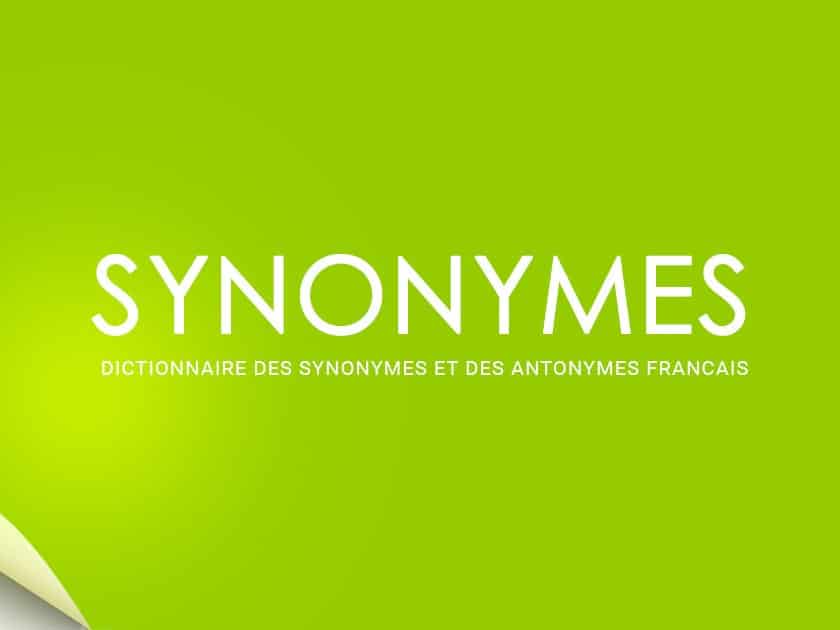
Where to Find French Synonyms
A lot of French learners get stuck using the same basic words over and over. You’ve probably noticed that native speakers don’t have this issue: They can choose just the exact word to say what they mean. To be fair, they’ve had their whole lives to build a diverse French vocabulary, but you can catch up.
What you need are some great resources to find French synonyms (words that mean exactly or nearly the same as another word) for the vocabulary you use too much. They’ll wake up your French language skills and open you to new meanings and ideas you couldn’t express before. To get you started, we’ll show you our four favorite online French synonym resources to bookmark right away.
Contents
Download: This blog post is available as a convenient and portable PDF that you can take anywhere. Click here to get a copy. (Download)
French Synonym Resources
Now that you have an idea how helpful French synonyms can be, we’ll show you how to discover more on your own.
Knowing how to take advantage of resources such as these will help increase your word power—not only the number of words you know, but also how appropriately you use them.
1. Larousse
Larousse is a thorough French dictionary as well as one of best and most authoritative references on the French language.
Although a dictionary is often used to find a word’s meaning, this helpful dictionary offers several additional features. Many words have several tabs in the entry, including a synonyms tab. This tab lists several synonyms organized around each of the word’s meanings.
For instance, search the word cher. You’ll see that it could be used to mean “expensive,” referring to how much something costs. An appropriate synonym for this meaning might be coûteux (costly), at the top of the synonyms tab.
However, you can also use cher to refer to something or someone that’s precious or important to you. A possible synonym in that case would be adoré (beloved).
Keep in mind that Larousse doesn’t list synonyms for every single word, but only those with a sufficiently broad meaning. Some words have such a specific meaning that true synonyms don’t exist.
Depending on the word, you might also see tabs for antonyms, quotes and idioms.
2. Reverso
Reverso is a helpful French-English dictionary that also has a synonyms search box.
The entry includes synonyms and antonyms, as well as idiomatic expressions, examples and word origins.
Keep in mind that the level of detail varies depending on the word you search. You may find an exact definition for each word by clicking it and pressing chercher (search).
Furthermore, as with Larousse, the synonyms are organized according to each of a word’s possible meanings.
You’ll see a small number next to each string of synonyms. This number corresponds to a specific definition of the word you’re searching. Number 1 corresponds to Definition 1, for instance. You can find these definitions at the top of the page with the dictionary entries for the word.
3. Synonymes (Synonyms)
As the name implies, unlike the first two sites we’ve covered, this one is specifically intended for researching synonyms.
It’s straightforward to use. Simply type a French word in the search box on the main page and search.
On the entry page is a list of synonyms, which link not to their definition, but to their own synonyms.
There are two icons in the top right of the entry. The first, a book, will direct you to a definition for the word you’re searching. The second, a speech bubble, links to quotes containing that word.
Keep in mind that this website is entirely in French. It could be a bit confusing to navigate if you’re a beginner.
The simplicity makes it sufficient for a basic search, but its entries are generally not as thorough as the first two.
4. Synonyms FR
This site is similar to the previous one with its straightforward search box.
The entry page groups similar synonyms together. This means that synonyms corresponding to a particular definition of the word are listed under the same bullet point.
Each synonym, once again, links to its own synonyms rather than a definition.
This website has some English instructions and is a good basic synonym database. However, it includes less information than the other resources. This one provides synonyms and sometimes antonyms, but no special features like quotes or examples in context.
FluentU takes authentic videos—like music videos, movie trailers, news and inspiring talks—and turns them into personalized language learning lessons.
You can try FluentU for free for 2 weeks. Check out the website or download the iOS app or Android app.
P.S. Click here to take advantage of our current sale! (Expires at the end of this month.)
French Synonyms for Words You Use All the Time
Before we dive into our French synonyms resources, it’s useful to stock up on some synonyms for common words that French learners tend to over-use. We’ll demonstrate the similarities and subtleties of each word.
You’ll discover how synonyms can expand your French vocabulary and make your word choice more precise.
Synonyms for Aimer (To Like, to Love)
Aimer is one of the simplest, most beloved words in the French language. Nevertheless, love is a complex concept, which is why there are many delightful synonyms that allow you to talk more specifically about your romantic feelings.
Adorer (to love, to adore) and chérir (to cherish) may describe a strong liking or desire for a person, thing or activity, much like their English counterparts.
J’adore la mer. (I adore the sea.)
Nous allons chérir cette mémoire pour toujours. (We will cherish this memory forever.)
If you’re specifically speaking of romantic love, you can impress with passionate phrases such as brûler pour (literally, to burn for) and tomber amoureux(euse) de (to fall in love with).
Je dois la marier. Je brûle pour elle! (I must marry her. I burn for her!)
Il y a cinq ans que je suis tombée amoureuse de lui. (I fell in love with him five years ago.)
Recall that amoureux becomes amoureuse if the speaker is a woman.
Synonyms for Sympathique (Nice)
Sympathique is a good word, but if it’s one of the only words you know to describe people, the compliment will quickly lose its meaning.
For instance, at my school, Moody Bible Institute, if someone describes another as “a great guy/girl, loves the Lord,” the response will often be, “that bad, huh?” When a good word or compliment is overused, it just becomes mediocre.
Fortunately, French offers many ways to praise a person’s positive social qualities.
To emphasize how well a person interacts with others, you may employ adjectives such as amical(e) (friendly) or accueillant(e) (welcoming).
Elle est si accueillante. On dîne chez elle souvent! (She is so welcoming. We dine at her home often).
To describe a person’s general personality, you could also say gentil(le) (kind) or chaleureux(euse) (warm, in the emotional sense).
Mon frère est vraiment chaleureux. J’adore passer du temps avec lui. (My brother is really warm. I love spending time with him.)
Synonyms for Une Personne (A Person)
Une personne is a very helpful, seemingly straightforward word. However, it too has several synonyms that subtly alter the meaning.
Calling someone un être humain (a human being) might call attention to that person’s inalienable rights. On the other hand, using un individu (an individual) might emphasize someone’s independence.
Laisse-lui choisir. Il est un individu. (Let him choose. He’s an individual.)
Similarly, there are multiple ways to refer to groups of people.
Les gens (people) is a very broad term that refers to the human race in general. On the contrary, un peuple (a people) refers to a specific group, such as a national or ethnic group.
Les bibliothèques aident beaucoup de gens. (Libraries help a lot of people.)
Le président travaille pour le peuple français. (The president works for the French people.)
Note that les gens is plural since it describes multiple people, while un peuple is singular because it refers to a group as a whole.
Synonyms for Essayer (To Try)
Essayer is a great word to know because, despite what Yoda may suggest, sometimes we try, but just don’t succeed.
Nevertheless, learning some synonyms will advance your vocabulary and allow you to choose the most appropriate word for the task you’re discussing.
Tâcher (to try) has a closely related meaning to essayer, while s’évertuer (to strive for) emphasizes the difficulty of a given task.
On doit toujours s’évertuer à approfondir nos connaissances. (We must always strive to increase our knowledge.)
Goûter (to try, taste) is used specifically to talk about food.
Il faut que vous goûtiez les croissants! (You must try the croissants!)
Tester (to try) is similar to the English verb “test,” as in, trying an appliance or application to see if it works.
Je veux tester mon nouveau appareil-photo. (I want to try/test my new camera.)
Synonyms for Une Chose (A Thing)
Une chose or “a thing” is a word that gets thrown around a lot. Overuse can make conversations sound dry and boring.
Un objet (an object) has a similar meaning and un truc (a thing) is common in casual French discussions.
C’est pas mon truc (It’s not my thing) is an informal way to say that something doesn’t interest you or isn’t your “cup of tea.”
Consider les affaires (things, personal belongings) to refer to items you own, or un bien (a possession) to denote a specific good or belonging.
On garde ses affaires chez nous quand elle voyage. (We keep her things with us when she travels.)
Son violon est son bien le plus précieux. (His violin is his most treasured possession.)
The French language, like French food, is plentiful, abundant, lush (notice the synonyms?).
Getting to know some French synonyms, like studying the subtle effects of various spices, livens up your French repertoire and makes your communication more precise.
We’ve introduced you to some synonyms to get you started, as well as resources to keep the learning going!
Download: This blog post is available as a convenient and portable PDF that you can take anywhere. Click here to get a copy. (Download)
And one more thing...
If you like learning French on your own time and from the comfort of your smart device, then I'd be remiss to not tell you about FluentU.
FluentU has a wide variety of great content, like interviews, documentary excerpts and web series, as you can see here:

FluentU brings native French videos with reach. With interactive captions, you can tap on any word to see an image, definition and useful examples.

For example, if you tap on the word "crois," you'll see this:

Practice and reinforce all the vocabulary you've learned in a given video with learn mode. Swipe left or right to see more examples for the word you’re learning, and play the mini-games found in our dynamic flashcards, like "fill in the blank."

All throughout, FluentU tracks the vocabulary that you’re learning and uses this information to give you a totally personalized experience. It gives you extra practice with difficult words—and reminds you when it’s time to review what you’ve learned.
Start using the FluentU website on your computer or tablet or, better yet, download the FluentU app from the iTunes or Google Play store. Click here to take advantage of our current sale! (Expires at the end of this month.)







